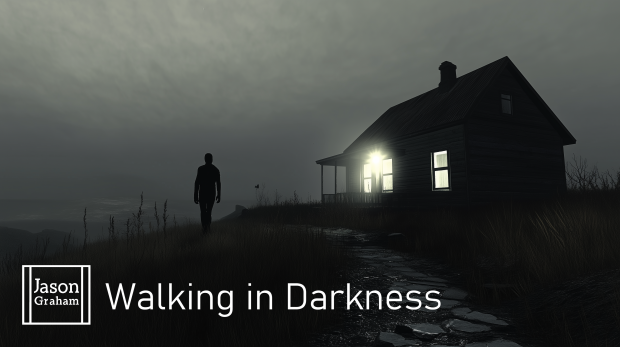
What did it mean when Jesus said ‘Hallowed be your name’ in prayer? AI hosts discuss Jason Graham’s teaching on the action implicit in this phrase.

What did it mean when Jesus said ‘Hallowed be your name’ in prayer? AI hosts discuss Jason Graham’s teaching on the action implicit in this phrase.

Discover how “Hallowed be Your name” calls us to worship, reverence, and a life set apart for God’s glory.

Worship, wonder, and why God’s throne doesn’t mean He’s far away. This episode unpacks the profound truth that God is both exalted and near—our King who reigns in heaven and our Father who draws close. Through Scripture and thoughtful reflection, we explore how understanding God’s transcendence and immanence reshapes how we approach Him in prayer and everyday life.

Discover what Jesus meant by “Father” in the Lord’s Prayer—and what it reveals about God, identity, and freedom in Christ.
In this episode of the Experiencing Grace Podcast, we listen to Part 2 of The Disciples Prayer Series: Father. Why did Jesus choose that word? What does it reveal about God—and about us?
We explore how Jesus didn’t just talk about God—He revealed Him. Through His life and teachings, Jesus showed us a Father who is intimate, loving, and full of grace. He declared the Father, embodied Him, and made Him known.
We also unpack what it means to be sons and daughters of God—not servants trying to earn favor, but heirs adopted into the family. We are co-heirs with Christ, free from the law, and empowered to serve from love, not obligation.
The parable of the prodigal son brings this truth to life. Whether you’ve wandered far or stayed close, the Father’s heart is the same: You are my child. Come home.
This episode is a powerful reminder that:
Tune in and rediscover your identity in the Father’s love.


When Jesus taught His disciples to pray, He began with “Our Father in heaven.” Why that phrase? Why not just “Our Father”? The placement of “in heaven” is deliberate—it speaks to God’s exaltation, authority, and holiness, distinguishing Him from everything profane or common.
Scripture consistently defines heaven as God’s throne, emphasizing His position above all creation. Isaiah, David, Jesus, and even Stephen—the first Christian martyr—all affirm that God reigns from heaven. If God has a throne, then He must be King. And not just any king—He is King of Kings, the Most High, the Creator of heaven and earth.
Here’s where things get profound: God is both transcendent and immanent. This means He is high above us yet draws near. He is incomprehensible and ineffable, yet He chooses to reveal Himself. The phrase “Our Father in heaven” captures this paradox perfectly—Father (close) / In Heaven (beyond us).
How do we approach such a God—so grand yet so personal? The Bible guides us:
God, in His grace, has seated us with Christ in heavenly places. We are heirs of God, co-heirs with Christ, no longer slaves to sin, but victorious through Him.
And yet, does that diminish our need to worship? Absolutely not. If anything, understanding our honored position should increase our reverence for Him. Even the twenty-four elders, exalted in the heavenly vision of Revelation, cast their crowns and worship. The more we grasp God’s greatness, the more worship becomes our natural response.
At the end of the day, God is King. He is exalted. He is worthy of worship. What does He ask of us? That we love Him and love others—for love fulfills all the commandments.
Dive deeper into this truth through the full message, audio, and notes.

This episode kicks off The Disciples’ Prayer Series, a 12-part journey exploring the Lord’s Prayer in depth. Jason Graham begins with the first word: “Our“—revealing the profound call to unity in the body of Christ.
Why did Jesus teach His disciples to say ‘Our Father’ instead of ‘My Father’? Because unity is central to God’s purpose, bringing all things in heaven and earth into oneness in Christ. Jason unpacks how biblical unity impacts God’s kingdom, the body of Christ, and individual believers—leading to blessings, answered prayer, humility, and spiritual maturity.
Discover practical ways to cultivate this oneness, including honoring others, dying to self, and embracing the ‘one another’ commands of Scripture. Jason also warns against false unity—showing how true biblical unity must have Christ as its head.
Join us as we begin this powerful series, uncovering the deeper meaning behind every word of the prayer Jesus taught His disciples.

Exciting news about The Disciples’ Prayer Series!
If you’re familiar with this blog or attend my local church, where I serve as a teaching pastor, you may recall my teachings on The Disciples’ Prayer Series in 2014-2015. Although I taught the entire series, much of the audio was lost, and I couldn’t update the site beyond the ‘Forgive Us Our Debts’ message.
I’ve started teaching through the series again at my local church, and all new notes and audio will be archived here under the “New Disciples’ Prayer Series” category.
We are working very hard this time to ensure that none of the audio gets corrupted or lost, but of course there is no guarantee that there will be no technical difficulties.
Either way, I invite you to Subscribe to My Newsletter for updates to stay in the loop about all of this information. When you confirm your subscription, you will immediately be given download links for the Notes and Audio for the first lesson “Our” that I have not published yet on my site.
I have been updating the lessons in the series and working on turning them into a book. Though there’s no set publication date, I’ll occasionally update this site as I work on the manuscript. You may even see some sample chapters here. So, stick around.
Every part of the prayer Jesus taught His disciples unveils profound truths about God’s character and our relationship with Him. These teachings are not just for information—they’re for transformation, helping us become more like Christ in our daily walk.
I’d love to hear your thoughts on these teachings. What insights have you gained from studying The Disciples’ Prayer?


There are many ways in our walk with God to have fire and passion stirred up inside of us; however, absolutely nothing can replace the power of the Word of God to stir our hearts to burn. When we actively seek understanding from Jesus as we study the Bible, then we absolutely burn inside–whether we immediately recognize it or not. The disciples on the road to Emmaus experienced this. After realizing that they had been speaking to the resurrected Christ, they looked at one another and said “Were not our hearts burning within us while he talked with us on the road and opened the Scriptures to us?”
I originally taught this lesson in 5 parts, but here the audio is presented in one lesson with the original notes provided split up into days. Here are the topics covered:
I’d love to hear your thoughts on the teaching, or to answer any questions you have. Leave comments below.


I wanted to include this message as the first teaching on this site because this study has been one of the most impactful on my personal view of God’s Grace. I started out to teach a message about Jesus being our advocate, but I was so bothered with a scripture that I had never found a satisfying answer to, that I went on a search to figure out what it meant. By the end of my study, I found myself overwhelmed at the goodness of God’s Grace and His great kindness toward us.
This message basically became a spoken commentary on the book of 1 John. If you are interested to find out what the difference is between struggling with sin and walking in darkness, then I encourage you to listen to this message, read the notes, and let me know what you think in the comments below.
Never miss an update—subscribe for notes, audio, & podcasts!